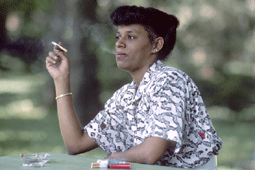Smoke Gets in Your Lungs
Air Date: Week of February 3, 2006

(Courtesy of National Cancer Institute)
California is the first state in the U.S. to declare secondhand smoke a toxic air contaminant. EPA research has shown that exposure is linked with asthma, abnormal cardiovascular development, and breast cancer in pre-menopausal women. Living on Earth's Ashley Ahearn reports.
Transcript
CURWOOD: Secondhand tobacco smoke is now considered under California law to be an air pollutant – right up there with vehicle exhaust, arsenic, lead and a host of other toxins. The state’s Air Resources Board made it official on January 26th. The move is likely to lead to further limits on the places where smokers can light up in California. Living on Earth’s Ashley Ahearn reports.
AHEARN: For these residents of the San Francisco Bay area, the news made perfect sense.
MAN1: Doesn’t surprise me at all. I mean, I think it’s been known for quite a while that secondhand smoke is very toxic.
WOMAN1: No, it doesn’t surprise me. I still can’t believe there’s cigarettes on the market.
WOMAN2: No, it doesn’t me.
MAN2: I think it’s certainly appropriate. It is a toxic pollutant and it should be regulated as such.
AHEARN: And the research backs them up. It’s shown for some time that secondhand smoke can cause lung and nasal cancers, heart disease and asthma, among other illnesses. More recent research has found secondhand smoke to have negative health consequences for pre-menopausal women and their children. In April of last year, California Environmental Health scientists synthesized the results of the new research. Dr. Melanie Marty headed the study.

(Courtesy of National Cancer Institute)
AHEARN: Dr. Marty adds that even if you don’t get asthma as a child from exposure to secondhand smoke, studies show you could develop it as an adult. Other studies Marty’s team reviewed found a link between secondhand smoke breast cancer in pre-menopausal women.
MARTY: There’s 14 studies that we looked at that separated women out by age or menopausal status and 13 of those 14 find an elevated risk; and at least half of those are what we term statistically significant. The average risk turns out to be about 68 percent higher risk for nonsmoking women regularly exposed to secondhand smoke versus nonsmoking women not exposed to secondhand smoke.
AHEARN: Recent studies have linked exposure to secondhand smoke during pregnancy to premature birth and low birth weight, factors that can lead to a host of other infant health problems including stunted heart growth, abnormal lung development and Sudden Infant Death Syndrome. Dr. Stan Glantz is a professor of cardiology at the University of San Francisco and was on the panel that reviewed Dr. Marty’s findings.
GLANTZ: A cigarette is like a little toxic waste dump on fire. I mean, that’s the way I think of it. And it puts huge amounts of highly toxic chemicals into the environment, either indoors or outdoors.
AHEARN: Dr. Glantz predicts this new research, especially the work supporting links between secondhand smoke and breast cancer, will lead people to change their behavior when it comes to tobacco smoke exposure.
GLANTZ: If you have a teenage daughter living at home do you want to be increasing her risk of breast cancer just because you need to suck on a cigarette when you could just go outside and avoid that risk? And I think that this may well say to teenage girls who are going out on dates that they don’t want their boyfriends smoking around them, and they don’t want to be going to places where people are smoking. And, you know, that’s a very powerful message.
AHEARN: David Howard, a spokesman for tobacco producer RJ Reynolds, says there’s no research to support California’s move to declare secondhand smoke a toxic air contaminant. And for Californians? It’s too early to tell what kind of regulations will result from the new designation. But smokers aren’t likely to have police busting into their living rooms any time soon. For Living on Earth, I’m Ashley Ahearn.
Links
Living on Earth wants to hear from you!
Living on Earth
62 Calef Highway, Suite 212
Lee, NH 03861
Telephone: 617-287-4121
E-mail: comments@loe.org
Newsletter [Click here]
Donate to Living on Earth!
Living on Earth is an independent media program and relies entirely on contributions from listeners and institutions supporting public service. Please donate now to preserve an independent environmental voice.
NewsletterLiving on Earth offers a weekly delivery of the show's rundown to your mailbox. Sign up for our newsletter today!
 Sailors For The Sea: Be the change you want to sea.
Sailors For The Sea: Be the change you want to sea.
 The Grantham Foundation for the Protection of the Environment: Committed to protecting and improving the health of the global environment.
The Grantham Foundation for the Protection of the Environment: Committed to protecting and improving the health of the global environment.
 Contribute to Living on Earth and receive, as our gift to you, an archival print of one of Mark Seth Lender's extraordinary wildlife photographs. Follow the link to see Mark's current collection of photographs.
Contribute to Living on Earth and receive, as our gift to you, an archival print of one of Mark Seth Lender's extraordinary wildlife photographs. Follow the link to see Mark's current collection of photographs.
 Buy a signed copy of Mark Seth Lender's book Smeagull the Seagull & support Living on Earth
Buy a signed copy of Mark Seth Lender's book Smeagull the Seagull & support Living on Earth

